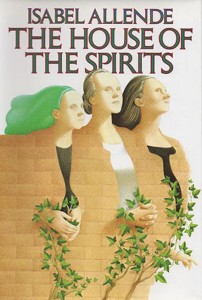 This week, a review committee in North Carolina sided with the freedom to read when they voted unanimously to keep Isabel Allende’s The House of the Spirits in the curriculum, but the parent who filed the complaint against the book intends to appeal the decision.
This week, a review committee in North Carolina sided with the freedom to read when they voted unanimously to keep Isabel Allende’s The House of the Spirits in the curriculum, but the parent who filed the complaint against the book intends to appeal the decision.
Chastity Lesesne filed a complaint against the book when it was assigned to her son in a sophomore honors English class at Watauga High School in North Carolina. Lesesne called the book “graphic,” “immoral” and “pornographic,” but the review committee disagreed with her assessment that the depictions of sex, rape, and violence are unacceptable for high school students.
Kellen Short with The Watauga Democrat reported on Lesesne’s protest:
“It is too graphic to escape from. It is too consistent,” she said Wednesday. “It’s not a few cuss words here and there. It’s not a reference to a sexual act. It’s not even one sexual encounter. It is continuously throughout the book and graphically painted.”
The House of the Spirits follows several generations of the Trueba family and draws on Allende’s personal experiences. It has garnered critical acclaim since its 1982 publication, including being named the best novel of the year in Chile, and it has found a regular place in high school curricula.
The instructor of the course Lesesne’s son was enrolled in, Mary Kent Whitaker, spoke with Short about the impact of the book on students in her classroom:
Whitaker said she used the book last year as well and found it valuable not only to teach theme and character development but also about the political, social and artistic context.
She said reflections written by former students offered high praise for the book and what it taught. “In terms of the works I’ve taught, this one has produced more growth in reading and critical thinking skills,” Whitaker said. “They come away from the month unit just feeling like they have learned so much and pushed themselves.”
An alternate book is available for students who choose not to read The House of the Spirits, but Lesesne calls the alternative “punishment.”
Whitaker is not allowed to use the book while it is under review, so the class is currently studying another title. Lesesne claims she is not trying to censor the book, but The House of the Spirits is not currently part of the collection in the school’s library. Should Lesesne’s appeal be successful, the result may be total removal of the book from the system, which can only be described as censorship.
Please help support CBLDF’s important First Amendment work by making a donation or becoming a member of the CBLDF!